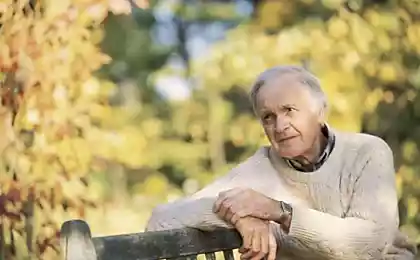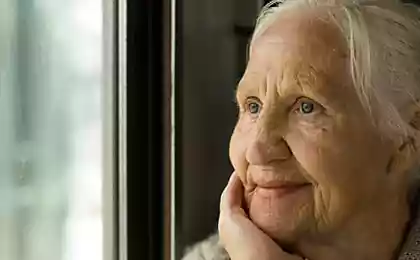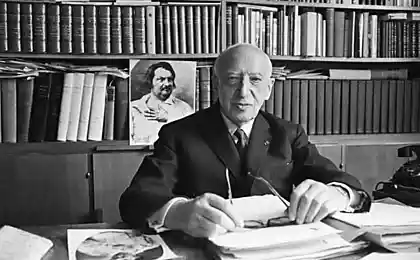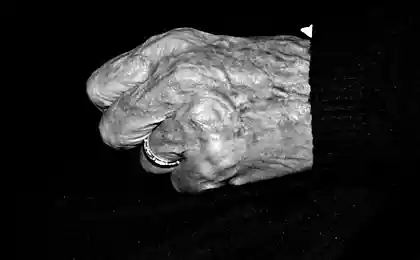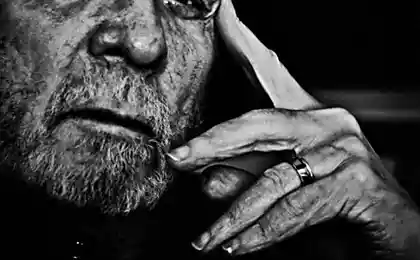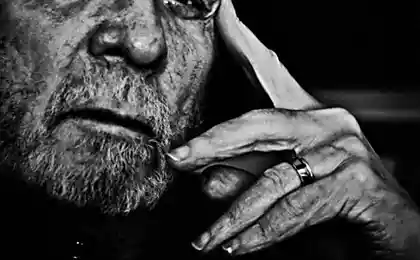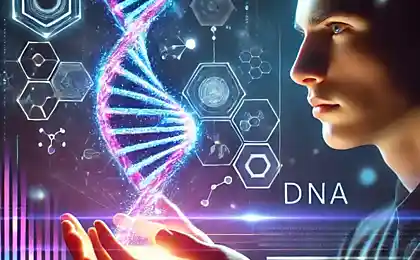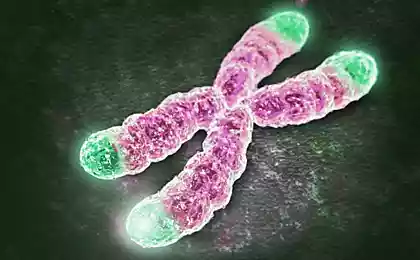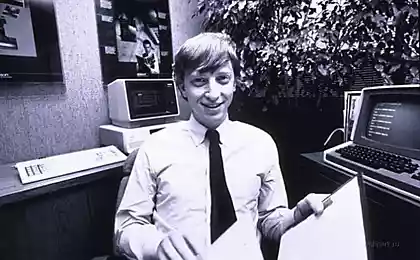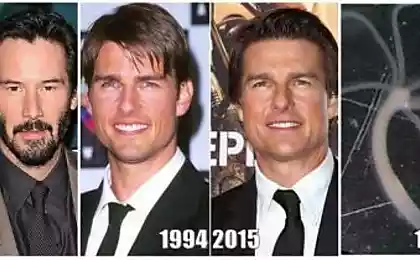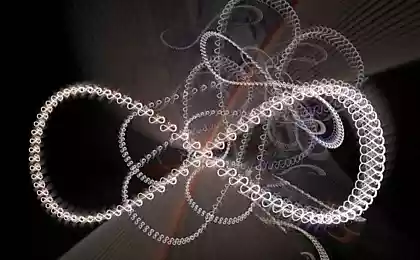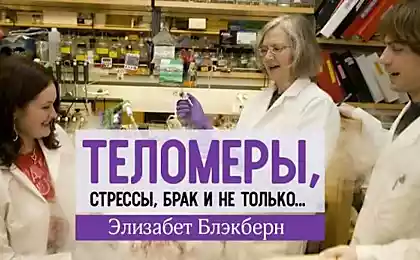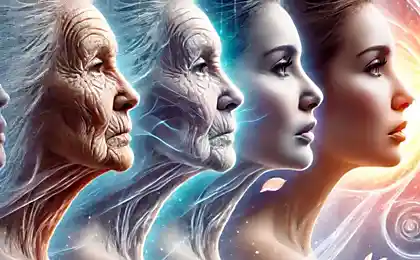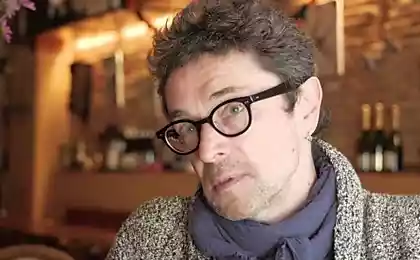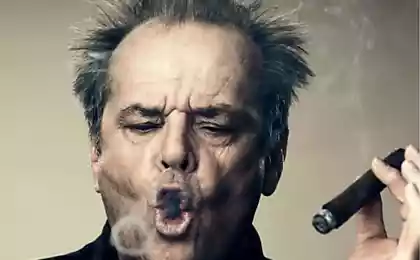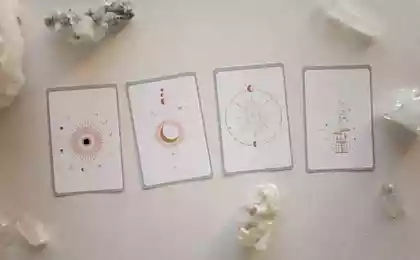340
Biologist Bill Andrews on telomeres and the cure for old age

The famous American scientist Bill Andrews came close to creating a drug that slows down the aging of cells. The drug works by using telomerase, an enzyme that Bill and his research team discovered. The scientist is also engaged in running and at 62 he overcame the most difficult ultramarathon in the Himalayas - and this is 222 kilometers without stopping in the rarefied mountain air. T&P spoke to him about health, sports and old age, which can be delayed without pills.
- Your research is based on telomeres and telomerase. What is it and how does it work?
- Telomeres are the tips of our chromosomes. In nature, chromosomes contain DNA molecules with genetic information that determines the color of hair, eyes and everything else. Each molecule is like a long chain of records, or “bases.” There are hundreds of millions in each chromosome. In fact, the DNA molecule is like a shoe lace, and the telomeres are like pistons at its ends. Over the past 30 years, we've learned that these pistons shrink with age, and we've shown that short telomeres are associated with almost every imaginable disease that a person can get as they age. We are now trying to restore the length of telomeres in a living cell, or at least slow down the process of their contraction. We have published hundreds of publications in scientific journals, talking about how they are related to the state of human health. We don't know exactly what's the cause and what's the effect, but most of the research proves that telomere reduction causes disease, not the other way around.
I led a research team that discovered an enzyme called telomerase responsible for maintaining the length of these sections of chromosomes. Telomerase is produced only in our gametes: babies are born with long telomeres, and then, with age, the process of their reduction begins. We took telomerase, injected it into other human cells in a petri dish, and we saw that the cells got younger and the telomeres in them grew. A second group of scientists at the same company later placed these cells on the backs of laboratory mice and noticed that the skin in these areas became young again. This suggests that the mechanisms of aging can be reversed.
After these discoveries, a third group of specialists at Harvard, led by Dr. Ronald de Pino, using gene therapy techniques, managed to lengthen the short telomeres of old mice. When they did this, they saw that within a few weeks the mice were young again. This saved them from many diseases associated with age. We don't know 100 percent whether telomere repair can cure disease, but I'm 99 percent sure, based on a lot of scientific literature. And yet we want to know for sure before we make pills for humans. In addition, the techniques used in the case of mice are not suitable for humans: not because of telomerase, but because of the side effects of gene therapy itself.
My company is testing chemicals and adding them to human cells in petri dishes in search of what will trigger the telomerase production process. Among the hundreds of thousands of applicants, we found natural substances that Isagenix uses to produce its products. In addition, in South Korea, New Zealand, Australia and China there are cosmetics for the skin, the effect of which is based on the action of telomerase – although synthetic substances are used for production. We have conducted clinical trials of this cream and found it to be the most effective anti-wrinkle and re-establishment of skin elasticity we have ever considered. Unfortunately, we have not studied the effect of this cream on wounds, although users say it heals them.
- In general, there is a hypothesis that the whole aging process did not always exist. Is that so?
- I believe that aging is a recent invention of evolution. There are still beings on this planet that lack this mechanism, or at least we don’t notice it. These are lobsters, turtles, bivalve mollusks, some whales, fish and birds. In all these animals, telomerase is constantly produced in the cells, and the telomeres do not shorten.
This has all been discovered recently because humans have never really been interested in how long animals live. Most animals cannot tell their age, they do not have growth rings or wrinkles. You can only find a newborn animal, put a device on it and observe it. In some cases, even after many years, the animal shows no signs of aging.
Charles Darwin, for example, had a tortoise named Garrietta who died suddenly at the age of 180, but it wasn’t because of old age. There are turtles that were born more than two hundred years ago and are still alive. Recently, fishermen caught a bowhead whale on whose skin they found a harpoon made 130 years ago. And bivalve mollusks have stripes on their shell, each of which grows in a year, and now people find mollusks older than five hundred years. All this happens because their telomeres do not become shorter, and telomerase is produced in all cells of the body. These animals also rarely have serious illnesses, including cancer.
The question arises – why did the aging process appear in nature? I think there's a great theoretical explanation for that. The purpose of evolution is to help us adapt to changing environments. In the last two thousand years, we've been able to do that and we've become quite intelligent. Our ability to shuffle genes allowed us to do this, because if two people or animals produce offspring, they create a variant that has never existed on the planet before. In this way, we continuously improve our ability to adapt to change and improve the chances of survival of the species in the future – at the expense of new children and new generations.
However, if the elderly do not grow old, but remain healthy and sophisticated experiences, the young cannot compete with them for food, brides and everything else. As a result, genes are shuffled less often. So the species survives better if the old creatures are killed. A long life has no advantages after you have raised children: when they become adults, you become their competitor.
However, in terms of the mechanism, aging in nature is different: mice, for example, become decrepit due to oxidative stress and cardiovascular disease. There are twenty different theories about why we age. I can't believe any of them, but I can see that they all view dying as the process of burning cells. The question is when and how this process starts. I assume that evolution today is “processing” its different variants. Perhaps hundreds of thousands of years ago, aging did not exist, because there was no need to worry about competition with descendants: everyone could find a place for themselves.
Scientists have found that because of the shortening of telomeres, only humans and other primates age, as well as dogs, cats, horses, sheep, bears and pigs. In other living beings, this process is different, or it simply does not exist. Interestingly, most of the animals I listed above were domesticated. This makes me wonder if domestication, when hunting and defending themselves became unnecessary, could have caused them to create a new mechanism for aging in the genetic evolution of a species. We have also tamed rabbits or mice, and yet they do not age from shortening telomeres. People want to live long, with or without offspring. There are scientists who say that the human body is designed for 100 or even 120 years. Is that true?
- Three independent studies in recent years have confirmed that human life expectancy is increasing. In all cases, the maximum age was estimated at 125. Today, we no longer live to be 20 like the ancient Romans, nor do we live to be 45 like the people of the Middle Ages: our average age at death is about 80. However, the maximum life expectancy since ancient times has not increased at all.
Telomere shortening explains this perfectly. If you put human cells in a petri dish, we see that their length is reduced by about 5,200 bases in one year. At the time of birth, the telomere length is 10 thousand bases, and 125 years after that - 5 thousand. And this is provided that we lead a perfectly healthy lifestyle. However, we do not do this: we smoke, gain weight, neglect sports, experience stress.
Once we find a way to slow down the shortening of telomere length, stop it altogether, or even lengthen short telomeres again, it will allow people to live longer than 125 years. The oldest person on the planet is currently 116 years old, so at best it will be at least another eight years before we can test the theory. And we don't have a cure for old age yet. There are only things like Isagenix products, although we expect people who use them to live longer than 125 years.
I want to prove that I or someone else can live more than 125 years. I perceive old age as a disease from which we all suffer, and look for a cure for it. A lot of people, especially the U.S. Food and Drug Administration (FDA), don’t like what I call it. But when I run one mile (1.6 km) in seven minutes at the age of 100, they're going to start talking about old age, too. I want to prove that I or someone else can live more than 125 years. There is no point in living long if you do not live fully. I want to be able to show that you can be young and healthy at 130. When I, or anyone else, have accomplished this task, I will say that it is now incumbent upon everyone to agree that old age is a disease and can be cured.
- You said your biological age is now almost 20 years behind the actual age.
- Yes, at 60, I took tests at Life Length, where doctors measured the length of my telomeres. They determined that my biological age was 42. A week after that, Terry Grossman's lab sent the results of other non-telomere-related tests. They also identified my age as 42. Honestly, as a kid, I imagined 60-year-olds very differently, and it's an amazing feeling.
I take into account all the theories of aging that exist today, and do everything I can: lead a healthy lifestyle, include in the diet antioxidants, vitamin D, omega-3 fatty acids, exercise, try to reduce stress and the amount of garbage in life and be optimistic. The main thing to know is that death most often occurs only when telomeres get shorter: chromosomes, in fact, just begin to split at the ends. This process is likely to cause many diseases: cancer, cardiovascular disease, Alzheimer’s disease, osteoporosis and muscle dystrophy.
- You run a lot. What does it take to start running?
- To start running, you have to walk. Walking is as good as running - it just takes longer. "Get up and go," that's what my favorite group of running coaches Desert Sky Adventures say. Most people who begin to walk a lot at least six days a week, after a month or two, can no longer hold themselves still and not run. The body becomes more energetic, the joints work better. By the way, I first encountered pain in them when I took a break from running. But every time I go back to this activity, the pain goes away, and after two or three weeks there is only pleasure.
- What are the advantages of running?
- It’s amazing, but if you put a mouse on a treadmill every day and train its endurance, it will shorten its life. When running in the body there are many free radicals that are very harmful to the mouse body. Mice have a terrible problem with free radicals - the problem of oxidative stress, from which they age and die. But it's different for people. Both humans and mice have antioxidants that remove free radicals. However, in mice, their level is very low: 10 times lower than in humans. When people put themselves under stress during endurance exercise, they, like mice, produce a lot of free radicals inside their bodies – but their antioxidant levels jump, resulting in lower levels of oxidative stress than if they don’t.
There are scientific publications that say that the more you train endurance, the longer your telomeres. I was suspicious of it 25 years ago, but now I'm surprised how many 80-year-olds want to run 100 miles, forgetting they're old. They are active like teenagers and they run very well. As I ran my first 100 miles, one 75-year-old woman told me she would run alongside to show how to behave in ultramarathons. As we walked 85 miles, she noticed, "You look like you're all right." I'll gas it, see you later.” She went ahead and was half an hour ahead of me. I couldn't compete with her. She's 90 now and she's still running. My biological age is still 42 and I started running ultramarathons 26 years ago when I was 38 or 39.
- Which of your ultramarathons was the hardest?
La Ultra The High in the Himalayas, North India. There are other sophisticated ultramarathons in the world, such as the 135-mile-long summer Badwater in Death Valley at 54 degrees Celsius. I ran it twice, but it wasn't half as hard as La Ultra. The highest points of its route are at an altitude of 5.5 km above sea level, the lowest - at an altitude of 3.3 km. When I participated in this ultramarathon, the route was 222 km long. Non-stop.
I was one of three runners who competed in the first year of the race. Back then, the government was convinced that it was impossible to overcome this distance in such conditions, no one could cope with it. Organizers sent out invitations to 25 runners who had already tried their hand on routes like Badwater, and 22 of them refused. On the appointed day, there were only three at the start - and two, including myself and my wife Molly Sheridan, ended up in the hospital as a result. Only one guy from the UK came to the finish line barely in time. My wife went back to La Ultra The High a year later to do it from start to finish, and I came back two years later. Molly was the first American and the second person on the list of oldest runners who managed to do this, and the oldest was me.
In my first year, I had a bout of gallstones on Mile 50. I thought I was gonna die. I did not have altitude sickness, but in the second year of the ultramarathon, many athletes had to retire because of it. I am looking forward to another opportunity to participate in La Ultra The High. Now the distance is 333 km and I want to run them. So far, only one person has managed to walk this distance to the end. You're a fighter.
- No, I think it's just fun, it's an adventure. I can’t live without adventure, and the best way to get involved is to be on the move. Soon there will be a documentary film "The High", which starred my wife. In this picture, it is clear that such a competition is primarily a communication.
- Is your job in medicine like a marathon?
- When I started the company, I said to myself, "This is my new ultramarathon." I spent 100 per cent of my time on it, didn’t run for a few years and gained 45kg as a result. I had all the problems that are usually associated with being overweight, and my doctor said, "Go back to your ultra marathons or you'll die." I started running again, and now I'm not going to stop. I set my priorities and try to stay in good shape. It's not good enough to cure humanity of old age and die of health problems so that everyone but myself can enjoy the fruits of my work. I'm sure there will be a treatment that will extend our lifespan by lengthening our telomeres and reversing aging. I think we'll have this medicine in three years.
- Why three?
- Because we have gone beyond our past achievements and are making new discoveries. We first found a substance that produced 1% of the monotelomerase needed in cells to stop the process of shortening telomere length. Then we discovered other substances and got to 5%. Then they started working in the field of medical chemistry and rose to 60%. We recently assessed our progress and saw that in a year’s time it would be 100% if we found a source of unlimited funding. But we don't have one yet. So we think, with the funds that we hope to get soon, we're going to need three years.
To make this medicine in the U.S., we're going to have to do animal trials. I would love to avoid it, but unfortunately, they are required by the FDA. Perhaps we will develop a product that can be sold in other countries, and then such tests will not be necessary. Frankly, I don't think they're necessary: all the animals that are legally required to be tested on don't age because of telomere length. The main animal in this area is the mouse, and in its case we will not be able to see anything. There are, of course, those Harvard mice, and maybe we can test them. But the problem is that even in these mice, the mechanism of telomerase production is very different from the human one. It was created artificially, and there is a possibility that the drug will not work. So when all is done, we will probably try to enter the market outside the US. I work a lot with South Korea, New Zealand, Australia and China, and I know it’s easier there. Of course, it's not nice to think about commerce, but in order for people to use it, it has to be accessible. I believe that in the beginning there will be many people who will need such a medicine.
Every time someone dies, I think it's our failure. I want this to end as soon as possible. I do not know what laws regulate the production of drugs in Russia, but I think it would be great if this drug appeared in your country.
Russian biochemist Vladimir Skulachev is also developing anti-aging drugs. I spoke to him five years ago, but he didn't mention telomeres at the time.
- Telomeres are a fairly fresh idea. We didn’t tell anyone about our research until 2008, when we decided to present it to the public due to funding difficulties. Then came the economic crisis, and all my investors lost the opportunity to invest in the project. We were the first to work in this field and achieved success, so our developments received a wide response. But even today, 99% of people know nothing about telomeres. And yet I think they're connected to one of the biggest breakthroughs in medicine. People have talked about a cure for old age and eternal youth for thousands of years, and today no one pays attention to this topic, but this will soon change. As soon as the big discoveries are made, people will begin to move away from the old ideas and see that it is now a real science.
- Why do you want to conquer old age and death?
- I love living. I want to do this as long as I can. My father changed terribly in old age because of Alzheimer's, and my mother became disabled. My father needs the help of nurses, my mother is close. I don't want to go through it and I don't want to see anyone else go through it. It's not just about old age, it's about disease. They are the main reason why people do not want to live long. Scientists have already done so much to increase human life expectancy, but they have not yet been able to significantly increase the length of its healthy period. As a result, many people have to go through heart surgery, coronary bypass surgery, chemotherapy and other procedures that help them survive. In 20 years, about 40% of the world’s population will be over 65 years old. There will be a lot of old people in the world, especially in China, South Korea and the United States. Russia will also face this problem. In all these countries, there will be a huge need for medical care. So when students ask me which specialty to choose, I say: care for elderly patients. This is the number one profession of the future, which will be the most demanded and highly paid in the world.
And yet we don't need old people lying in hospitals in need of someone else's care. I want people over 60 to dance, play tennis and spend their free time enjoying themselves. They should be healthy. That is why you need to think more about the duration of a healthy period of life than about its duration as a whole. When its boundaries become wider, the life span will increase.
I want people to live very long, maybe a few hundred years, without showing signs of fading. Yet we do not call cells without shortened telomeres immortal. Telomerase will not save humanity from death. People will still die in car accidents or on railway tracks, and diseases will still remain in the world - not all of them, not even all cancers, arise from shortening of telomeres. However, on average, everything will change very much. We're going to see a lot of people, de facto old and biologically very young.
- Why do you love life so much?
- I love adventure. I love nature, I am fascinated by discoveries. I can't wait for humans to discover life on other planets. I want to be here when that happens, and I want to be involved in research as we try to find out who these beings are. We have so many discoveries to make and I want to be a part of them. I'm fascinated by studying the ocean on Earth and the DNA of the creatures that live in it.
As a child, my brothers and sisters were as passionate about science and medicine as I was. When I was 10, I dreamed of having a telescope to look at the stars. I was given a toy telescope that year for Christmas, and it made me so upset that I burst into tears. My parents were so shocked by how seriously I took it all, they bought me the mirror telescope I wanted. It was 2.5 meters long, 200 mm in diameter. An incredible gift for a 10-year-old. I spent every night in the yard, looking at Jupiter and its moons, Saturn and its rings, and constantly running into the house, calling my parents and siblings to look at them. There, by the telescope, my father once said to me, "You're so passionate about science and medicine." You should become a doctor when you grow up and find a cure for old age. I've been obsessed with this for 53 years. Every time I think, “God, what a great idea!”
I love life because you can learn anything. That's the whole point of adventure. What will happen next, what will happen in a few years? That's why it's easy for me to run 100-mile marathons. I always want to move on and see what’s out there. I am so focused on what lies ahead that I lose track of time. Sometimes it feels like running 100 miles is so easy and it takes so little time. You know, the route of a marathon is sometimes circular and sometimes linear, when the finishing point is not where the starting point is. The last time it was like that, I ran to the finish line, and back to the start we went in the car, and I was shocked how far they were from each other. On the run, I didn't feel it at all.
You get so much more adventure when you get up and move forward. You can go where no one can go, see the untouched landscape. In some ultramarathons, food and water can only be obtained if a helicopter delivers them. I can't live without this competition.
And I like talking to people. Every time I meet someone, it’s a new adventure. I think if I ever get tired of living, it will be if I lose my health and someone has to take care of me. This has never happened to me before and I am doing everything I can to prevent it from happening. Surprisingly, this kind of care for someone also causes telomere shortening. Now there are studies involving people who are professionally engaged in this, and the organizers were able to find out that illness or old age, in fact, badly affects not only the patient, but also his assistants.
- By the way, you seem to be criticized by Christians, mostly for trying to change the length of a human life.
- No, actually, it's funny, but we found that's not true. One of our most enthusiastic potential investors right now is a Catholic hospital. And other members of the Catholic Church even wrote a whole chapter for my book Curing Aging. They explained why it could be part of the plan of creation. According to the Bible, God cast people out of Eden, and one of the qualities we lost after that was immortality. We began to grow old after the fall, and God wants us to one day get rid of it, regaining our eternal life.
- You have had to go through a lot of difficult times in your search for investment and recognition in the scientific world. What keeps you going?
- The hardest thing about this job is funding. I lost him so many times, I didn’t even have money to pay my employees’ salaries. But each time I managed to somehow escape by pulling the rabbit out of the hat at the last minute. I am driven by my faith in what we do. She's very strong. When I think about the fact that we can fail because of money, I realize that no one else will do our job for us. I'm just afraid that if we lose, 300 to 400 years from now, someone will realize that we were right, and I'll end up in a history book that says, "Bill Andrews did it 400 years ago, but he couldn't finish the job because of money problems." It's so depressing! The only purpose of my life is to do research and prove that increasing telomere length significantly increases the lifespan and length of its healthy period. There may be other reasons for aging. But our discoveries should give me another 20-30 years of life to find out. If we put together all the research that is currently being done, we will soon be able to achieve immortality. The hope is that this will happen while our generation is still alive, especially if we can extend our stay here through telomerase.
Source: theoryandpractice.ru
10 interesting facts that you should know about black holes
7 segments of muscular armor, or that we don't know about muscle cramps
